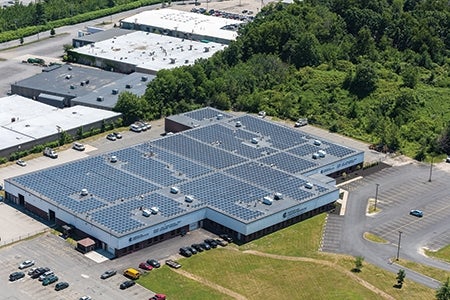Bill for 100-percent renewable energy gaining legislative support
 A solar installation covers the roof at 220 Brooks Street in Worcester.
A solar installation covers the roof at 220 Brooks Street in Worcester.
Massachusetts would need to get all of its energy from renewable sources by the year 2050 under legislation filed last month and backed by more than a quarter of state lawmakers.
Bills filed by Sen. Jamie Eldridge and Reps. Sean Garballey and Marjorie Decker would call for 100 percent renewable electricity by 2035 and 100 percent renewable energy economy-wide -- including electricity, heating, transportation and other sectors -- by 2050.
Supporters of the legislation on Monday said their goal was an ambitious one that would help fight climate change and would make Massachusetts the first state to commit to 100 percent renewable energy throughout its economy.
"One of the biggest reasons why we we are advocating for this piece of legislation is....that we need to set up a long-term framework and pathway to the transition. We know that we're not going to achieve 100 percent renewable energy overnight, but we can make sure that every decision we're making in the coming decades is going to make us that much closer to achieving that goal," Environment Massachusetts state director Ben Hellerstein said in a conference call with reporters.
The legislation has six cosponsors in the Senate and 47 in the House, according to Environment Massachusetts.
The state took steps toward adding more renewable power to its energy portfolio in August, when Gov. Charlie Baker signed a law directing utilities to procure 1,600 megawatts of offshore wind and about 1,200 megawatts of hydroelectric power. The Global Warming Solutions Act, passed by the Legislature and signed by Gov. Deval Patrick in 2008, set economy-wide goals to reduce greenhouse gas emissions to 25 percent below 1990 statewide levels by 2020, and 80 percent below 1990 levels by 2050.
The new legislation seeks to "complement and strengthen" the Global Warming Solutions Act, according to Environment Massachusetts. It would require the Department of Energy Resources to set binding targets for renewable energy growth and would gradually increase the renewable portfolio standard, a state policy requiring utilities to purchase a minimum amount of their electricity from renewable sources like solar and wind.
Steve Linsky, a volunteer with the Pioneer Valley advocacy group Climate Action Now, called the bill a necessary step and said he is seeing public demand grow for renewable energy.
"Out here, with every new solar installation on our houses, buildings and businesses, and with every new electric automobile and buses on our roads, we are now seeing a very real wave," he said. "The public's desire out here in western Massachusetts [is] to forge ahead into a new generation of renewable energy economy that provides more higher-paying jobs, cleans our air, protects our earth for future generations."
Renewable energy skeptics have raised questions about the reliability of such energy sources, and the costs compared to other power sources.
Hellerstein said the cost to move the state to total renewable energy is uncertain. He said existing incentives and programs that encourage renewable energy conversion could be expanded.
The bill would also establish a Clean Energy Workforce Development Fund to support job training, placement assistance and education for Massachusetts residents hoping to work in the clean energy industry.








0 Comments